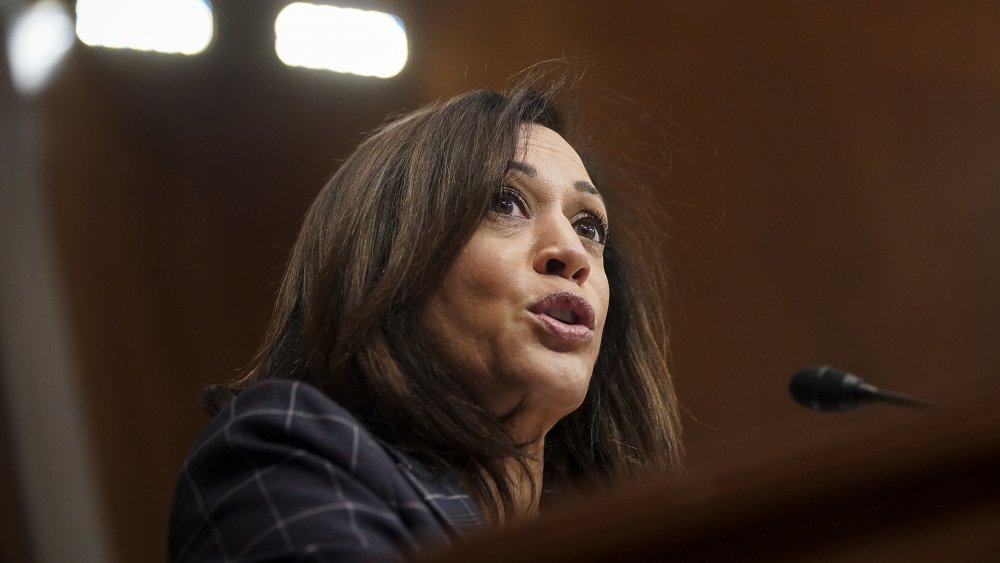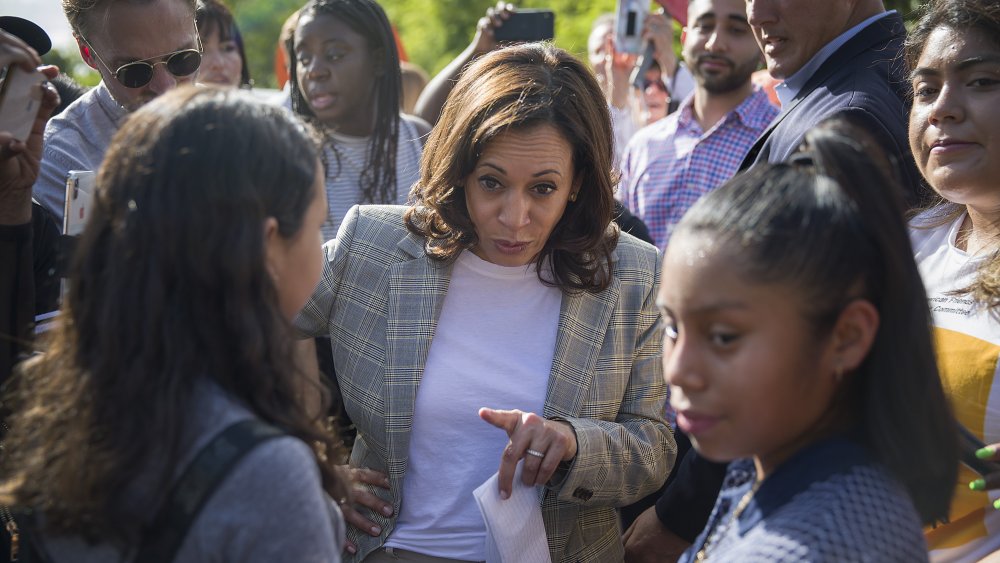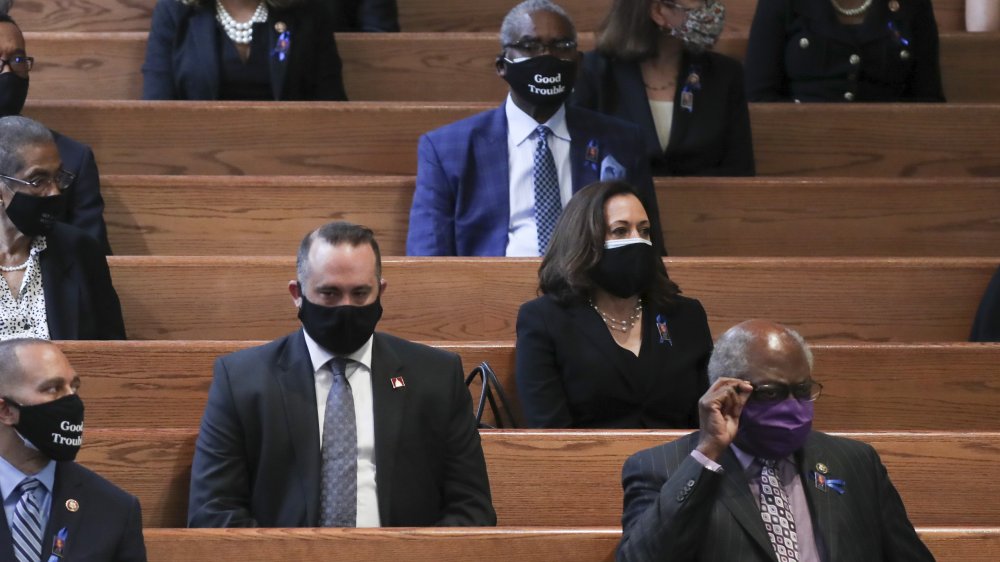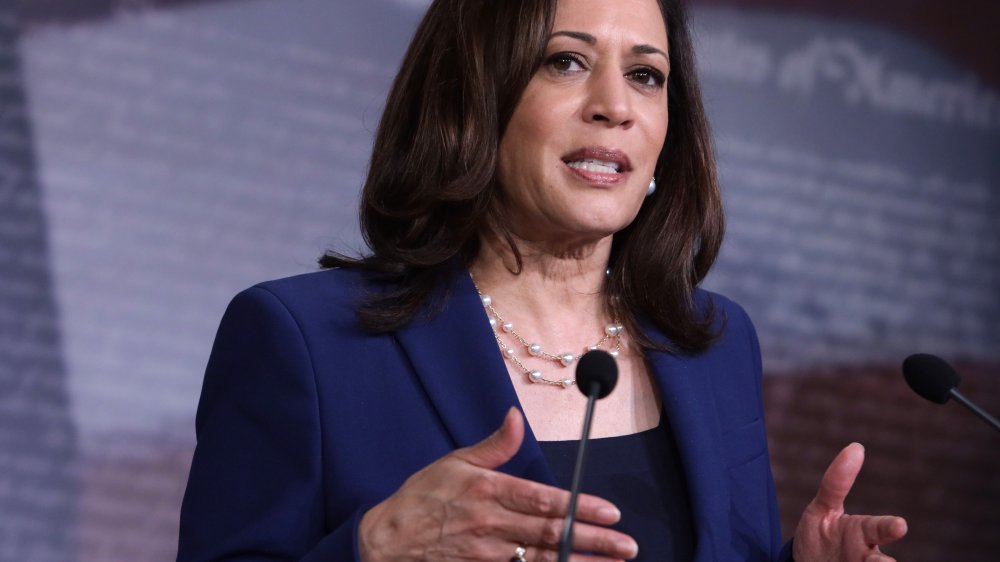The Untold Story Of Kamala Harris' Childhood
Kamala Harris wears many hats. She is a vice presidential contender. She's a Democratic senator. But before anything else, she was Donald Harris and Shyamala Gopalan's daughter — two immigrant academics who met after they traveled to the University of California, Berkeley for graduate school. Gopalan, who is Indian, opted to reject the cultural tradition of arranged unions to marry Donald Harris, a Jamaican, who would go on to teach economics at Stanford. They married while they were still at Berkeley, and Harris was born in Oakland, where her mother worked until her water broke (via Mercury News).
Harris' parents were active in the protests that defined the '60s, and she tells everyone she grew up with a "stroller-eye view of the civil rights movement" because her parents would take her to rallies and demonstrations when she was just a child. Harris says her "earliest memories are of a sea of legs marching around the streets and the sounds of shouting" (via Mental Floss).
"I grew up in a hot spot of the civil rights movement," she told The Washington Post. "But that civil rights movement involved Blacks, it involved Jews, it involved Asians, it involved Chicanos, it involved a multitude of people who were aware that there were laws that were not equally applied to all people."
Kamala Harris' parents divorced when she was 7
When Harris was 7, her mother and father separated after her father moved to take a professorship at the University of Wisconsin-Madison. They subsequently divorced and Gopalan won custody of the girls. "They didn't fight about money," Harris wrote. "The only thing they fought about was who got the books." The family stayed in Berkeley, and Harris had to travel by bus to a white neighborhood to go to school. She and her sister Maya often had to go to the lab where Gopalan worked as a cancer researcher to help clean test tubes.
And when they couldn't go to work with their mom, the girls went to a daycare ran by Regina Shelton, who often took the girls to the Twenty Third Avenue Church of God, an African American protestant church in Oakland. Harris' bond with Shelton was so strong that the bible she used during her swearing in as California's Attorney General and Senator was the same one that Shelton carried to church every Sunday. "She has always been engaged in African American politics, community struggles, community organizations, and life," Karen V. Clopton, one of Harris' longtime friends and who is now a judge and lawyer, told The Washington Post.
Kamala Harris had a multicultural childhood
While Kamala Harris kept in touch with her father and his family, it would be her mother, Shyamala Gopalan, who played a more significant role in shaping her girls. As a result, Harris and her sister Maya had a rich, multicultural childhood. "All my friends were Black and we got together and cooked Indian food and painted henna on our hands, and I never felt uncomfortable with my cultural background," Harris said. They traveled regularly to both Jamaica and to India to visit family on both sides, helping the future politician develop an appreciation for the world at large.
When Harris was in middle school, her mother — who had experienced both racism and sexism at Berkeley — decided to teach and do research in Canada's McGill University. Harris finished high school in Montreal and returned to the U.S. to go to college, but instead of going to Berkeley, she went to Howard University, a Historically Black University located in Washington, D.C. (via Howard University), where she double-majored in economics and political science. From there, she returned to California for law school, passed the bar the second time around, and became a prosecutor.
Kamala Harris' childhood shaped her
When The Washington Post asked Kamala Harris how her African American upbringing influenced her, she said, "It's kind of like asking how did eating food shape who I am today. It affects everything about who I am. Growing up as a Black person in America made me aware of certain things that, maybe if you didn't grow up Black in America, you wouldn't be aware of."
But she is Indian, too, and she remembers, even if the media has only recently taken note of that fact. Harris says both sides of her carry equal weight. More importantly, she says: "We have to stop seeing issues and people through a plate-glass window as though we were one-dimensional. Instead, we have to see that most people exist through a prism and they are a sum of many factors."



